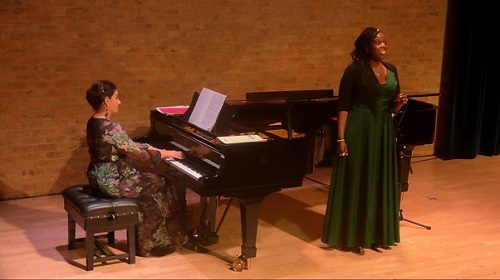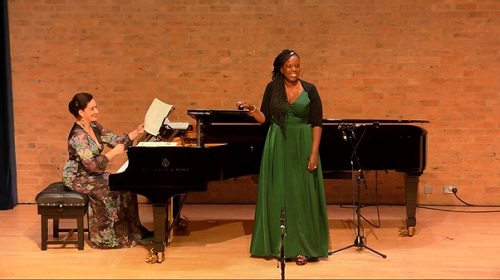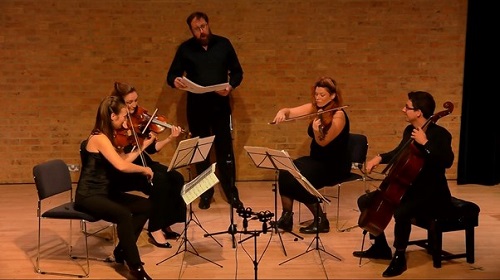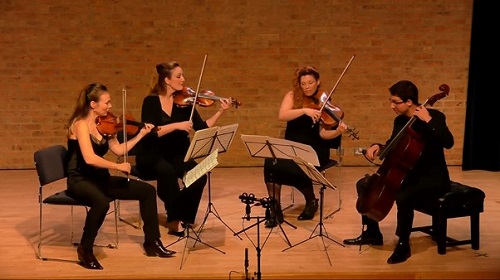Better—than Music! For I—who heard it—
I was used—to the Birds—before—
This—was different—’Twas Translation—
Of all tunes I knew—and more—
[…]
Let me not spill—its smallest cadence—
Humming—for promise—when alone—
Humming—until my faint Rehearsal—
Drop into tune—around the Throne— [Emily Dickinson, 503]
In a moment of transcendence, a poet recognises that they have received a great gift: they have heard the natural music of Eden, or musica mundana – a music so perfect and precious that it must be kept safe, secret, expressed in epiphanic poetry that grants its poet freedom from the restrictive conventions of the fallen world.
This year’s Oxford Lieder Festival is titled Nature’s Songbook, and that theme was intriguingly explored in two of the concerts performed during a weekend which focused on ‘Songs of America’. In a programme entitled Emily Dickinson’s Nature Songbook, soprano Nadine Benjamin and pianist Nicole Panizza presented settings of Dickinson’s poems by Aaron Copland, André Previn, Julian Philips (b.1969) and Juliana Hall (b.1958).
Musical references and allusions – particularly birds and their song – pervade Dickinson’s poems and letters. Through musical analogies she expressed emotional states and relationships – noting in one letter to Mrs J.G. Holland, ‘In adequate Music, there is a major and a minor’ – and also her thoughts about nature and immortality. Her use of the metres of hymnody, and of sound, results in a what has been described as a synthesis of music and poetry, an ‘inner music’: ‘“Hope” is the thing with feathers –/ That perches in the soul –’, she wrote.
When, in 1949, Aaron Copland began setting to music the poems that form his Twelve Poems of Emily Dickinson, Thomas Johnson’s urtext edition of Dickinson’s poems was still six years away, but the composer was evidently fascinated by the reclusive poet, visiting her home in Amherst, Massachusetts and declaring that he had set out to create ‘a musical counterpart to Emily Dickinson’s unique personality’. In her performance of Copland’s song-cycle, and indeed all these Dickinson settings, Nadine Benjamin gave a compelling voice to the poetic persona that impresses thought and feeling so strongly upon the reader. Expressing her gratitude to the audience at the start of the recital, she established a striking dramatic and communicative presence from the first, palpably feeling and expressing the conflicting emotions experienced by the poetic protagonist as she ruminates upon the natural world, the passing seasons, mortality and eternity.

In the opening song, ‘Nature, the gentlest mother’, the insects, birds and beasts of a benevolent Nature formed a continuum of sounds within the Nicole Panizza’s spacious, crystalline piano part, while Benjamin’s beautiful, gleaming soprano conveyed a sense of awe at Nature’s fecundity, as she shaped the declamatory phrases naturally and fluidly, easefully slowing and expanding at the close. These are challenging songs: Copland pushes the voice high and low as it traverses angular intervallic leaps, and Benjamin – who, with Panizza, recently released an acclaimed disc of Dickinson settings, Emergence, for Stone Record – was impressively confident in the tricky, pressing central section, and lost no colour or strength in the vocal line’s final descent. ‘There came a wind like a bugle’ swept peace roughly aside, Nature now a wild force which disturbs even the bell within the steeple, the ‘flying tidings’ of which did indeed ‘whirl’ with a jarring, metallic clamour, as Benjamin’s emphatic staccatos grew in intensity, adding to the apocalyptic mood. A rejoinder followed at the start of ‘Why do they shut me out of Heaven?’: “Did I sing too loud?” the poet-speaker questions with unrepentant assertiveness. Perhaps there might have been a little more dynamic contrast here, between the opening tirade and the wryly quiet rejoinder, “But – I can say a little ‘Minor’/ Timid as a Bird!”, thereby making Copland’s repetition of the initial question in the final bars of the song all the more bold, but the duo captured the sense of instability that surges through the poem.
Benjamin used ample colour and warmth to craft the lyrical lines of ‘The world feels dusty’, which reflects the human compassion which offers some consolation, while ‘Heart, we will forget him’ flowed beguilingly – the phrases expansive as Benjamin comfortably spanned the leaps of an octave and more – even as the poem reflected on the impossibility of love. Nature can heal the heart, though, and ‘Dear March, come in’ welcomed the Spring with blithe breeziness, as Benjamin captured the naïve energy of the poem, supported by the incessant bustle of the piano. The immediacy of her soprano conjured the palpable experience of nature ‘in the moment’. The song closes with acceptance of Nature’s impermanence, though, and here I found Panizza’s closing, irregularly patterned chords, which Copland marks ‘indifferent’ and ‘delicately’, a little too insistent. ‘Sleep is supposed to be’ was anything but acquiescent, however, as Benjamin’s widely spaced vocal phrases rang out sonorously, soaring over the piano’s tempestuous thundering. The last chord rumbled through the soprano’s high sustained final note, an echo which seems to confirm the primary of human experience in life above eternity. No wonder Copland asks the performers to take a long pause before continuing with the questions and uncertainties of ‘When they come back’.
The duo dramatized the terrible imagery of ‘I felt a funeral in my brain’ with vividness, making us share in Dickinson’s experience of the process of death – the tormenting inner buzz of mortality, the stamp of treading feet, the thud of a beating drum, the eventual silencing of the senses as enacted by Benjamin’s diminuendo during Copland’s, though not Dickinson’s, final stanza: “And I, and Silence, some strange Race/ Wrecked, solitary, here –”. Peace was restored by the soothing strains of ‘I’ve heard an organ talk sometimes’, the piano’s hymn-like chords unfolding simply but with a sense of cathedral-like majesty, while ‘Going to Heaven!’ danced jauntily, Benjamin’s sprightly phrases shining with excitement. I’m not sure that, in her demeanour, the soprano quite captured the underlying sentiment of the poem, however, in which Heaven is dismissed as something that the poet-speaker, ‘can’t believe’, even while she is glad that ‘the two I lost’ did believe. The piano’s lingering chords give prominence to that final assertion, but Benjamin did not sustain as marked the final phrase in which the poet-speaker confirms the finality of death, ‘I left them in the ground’. The final song was incredibly moving, though, Panizza’s bluesy dotted-rhythms shaped with a grace and decorum matching the civility of Death with whom the poet-speaker takes a carriage-ride towards eternity. Here, Benjamin’s sustained high conclusion glistened with rapture – a fusion, characteristic of Dickinson, of the earth-bound and the ineffable – or as the poet put it elsewhere, ‘The fascinating chill that music leaves,/ Is Earth’s corroboration/ Of Ecstasy’s impediment’.

The programme included some of the other Dickinson settings which Panizza and Benjamin include in their Emergence recital. André Previn’s Three Emily Dickinson Songs begin with ‘As Imperceptibly as Grief’, a late poem in which surprise at the rapid dissolution of life is countered by a conviction in immortality, elsewhere. Pazzini’s sombre, heavy chords had a rueful weight, and the vocal line had a lovely fullness, rich with emotion with then spilled over into the harmonic colours of piano writing. There is greater consonance and rhythmic and melodic stability in latter part of the song, and Benjamin soared with rhapsodic shine at the close: “And thus, without a Wing/ Or service of a Keel/ Our Summer made her light escape/ Into the Beautiful.” ‘Will There Really Be a Morning?’ was fresh and playful, the syncopated rhythms and gluey textures jazzy at times, while ‘Good Morning Midnight’ conveyed the poem’s uncertainties and striving – reflected in the registral leaps and roving melodic phrases – and also the poet’s determination that her inner light will sustain her.
I’m not sure that I find Juliana Hall’s musical interpretations of Dickinson’s verse as persuasive as Previn’s, but the three songs which form Upon This Summer’s Day – and which set poems which equate spring and summer with life – are attractive in their own right, and were given committed performances here. ‘Perhaps you’d like to buy a flower?’ had a playful perkiness, and the slightly coy quality of poem was communicated, the jaunty piano play-out evoking the motion of the bees, drunk on the flowers’ nectar, and the poet’s wry finger-wagging. In ‘Apparently with no surprise’, Dickinson reflects on the paradoxical and cruel indifference of a benevolent God who accepts the innate brutality of Nature – the spring frost decapitates a flower, the sun is an ‘assassin’ as it passes on to ‘measure off another day’. The tone is detached and impassive to begin with, even as it evokes a strong response, but grows angrier at the injustice of the world. Hall’s jazzy rhythms seem inappropriate, and the chuckle at the close from the audience in the Jacqueline du Pré Music Room suggested that the song had not conveyed Dickinson’s challenge to God’s omnipotence.
Benjamin strolled around and behind the piano for ‘When roses cease to bloom, dear’, addressing the song to Pazzini, who conjured the spirit of a circling, sad, slow waltz. The melismatic appeal to the reader, “Then take my flower, pray!”, was intense and rhapsodic, but perhaps did not quite capture the peacefulness of the poem, which both celebrates the experienced moment and by which the poet will be remembered, and which also reflects upon the calm Dickinson felt in the cemetery at Mount Auburn in Cambridge, Massachusetts, writing to a friend, ‘It seems as if Nature had formed the spot with a distinct idea in view of its being a resting place for her children, where wearied & disappointed they might stretch themselves beneath the spreading cypress & close their eyes “calmly as to a night repose or flowers at set of sun.”’
The recital began with a brief fragment, ‘The Butterfly’, one of the vignettes which comprise Julian Philips’ An Amherst Bestiary. The Jacqueline du Pré Music Hall was bathed in a purple glow, complementing the whimsicality of the riddling, hallmark compression of the poem. The translucent beauty and colour of Philips’ settings – the sparkle of light through the butterfly’s wing – was lovingly communicated, the vocal phrases arcing with the arthropod’s graceful swoop. This was a challenging song with which to begin – to pitch the first note securely, and sustain it evenly through the first phrase – but Benjamin began with an assurance she sustained throughout the recital. Perhaps, again, a little more dynamic contrast might have captured the sense of anger and surprise contained within the brief lyric: why is the butterfly’s life short, while the fly survives, chastened by the catacombs in which beauty is entombed?
The duo returned to An Amherst Bestiary at the end of their programme, presenting ‘An Afterword’, a meditation on nature. The bell-like ringing of the piano writing was simple but conveyed a sense of grandeur, and if Benjamin’s rhythms were a little ‘free’ then she evinced a consoling vocal shine at the close. The ‘afterword’ wasn’t the final word, however: ‘We wouldn’t mind the sun, dear’ from Luigi Zaninelli’s Seven Epigrams of Emily Dickinson offered an appropriately zestful, and contrary, end to the proceedings.

The recital had been prefaced by a talk by Erica McAlpine, Associate Professor of English at the University of Oxford, focusing on the role played by nature in Dickinson’s poetry, A Route of Evanescence. And, the previous day there has been an opportunity to enjoy another musical response to 19th-century poetry, when bass Matthew Rose joined the Albion String Quartet for a performance of Samuel Barber’s Dover Beach – a setting for voice and string quartet of Matthew Arnold’s poem, which reflects upon the moral and social decay of his age, and the potential for human love and individual action to overcome such disruptions.
Barber composed Dover Beach in 1931 when he was a 21-year-old student at the Curtis Institute of Music and, a fine baritone, he himself made the first recording of the work, with the Curtis String Quartet, in 1935. Rose, also a Curtis alumnus, has a full, smooth bass of beautiful warmth and pliancy, and though the opening moments are still and sweet, evoking the gentle rocking of the moonlit waves, he conveyed the import of the poet-speaker’s private ruminations, conjuring the inner urgency felt by the latter as he looks upon the full tide which laps the straits beneath the fair moon. The tenderness of the plea, “Come to the window, sweet is the night air!”, was tinged with sadness, the soft warmth and consonant harmonies of the strings both comforting and wistful. Initially, there was a pressing forward momentum which suggested the unstoppable motion of the ebbing water, a retreating ‘Sea of Faith’ that confirms man’s loss of certainty, shared belief and compassion. But, with the sound of the pebbles, tossed up the high strand, a weariness crept in, Rose’s bass full and firm, elongating the ceaseless “tremulous cadence slow” against the quiet violins’ “eternal note of sadness”.

The poet-speaker rues that the uniting convictions of the past have been replaced by present doubts which divide and separate, and here Rose used the strength of his bass to shape the melodic contours, giving sensitive prominence to telling poetic phrases and exposing man’s loneliness when faced with the “melancholy, long, withdrawing roar” of an indifferent Nature. The climatic cry, “Ah, love, let us be true/ To one another!”, soaring on a its own wave of almost desperate earnestness, was an urgent riposte to the rolling surf, as the strings conjured the antagonistic energies of inner and outer worlds. The realisation that the lovers’ “land of dreams” would offer “neither joy, nor love, nor light” throbbed with painful disillusionment and at the close, unconcerned by the clash of man’s “ignorant armies”, all that remained was the soft rocking of the sea, beautifully sculpted into silence by viola payer Ann Beilby.
The concert opened with an assertive performance of Freya Waley-Cohen’s Snapdragon, a work which I heard the Albion Quartet play at Wigmore Hall in September last year. The conversations between the four players are prickly and playful by turn, and the Albion relished the vigour and bite of the complex rhythmic interplay and vivid timbral contrasts which framed the calm lyricism of the central, more homophonic episode. To conclude, they offered a similarly committed performance of Dvořák’s ‘American’ Quartet, which Beilby introduced as one of their “favourite party-pieces”, describing the second movement as one of the most “heartfelt” in the repertoire. After the anxieties of Arnold and Barber, here was true musical consolation. The rhythms were tight, timbres were radiant, textures lucid. Melodies flowed with naturalness and a chamber intimacy prevailed. Absolutely lovely playing.
Claire Seymour
Dover Beach: Matthew Rose (bass), Albion Quartet (Tamsin Waley-Cohen & Emma Parker [violins], Ann Beilby [viola], Nathaniel Boyd [cello]).
Samuel Barber – Dover Beach; Antonin Dvořák – String Quartet No.12 in F Major Op.96, ‘American’.
Jacqueline du Pré Music Building, St Hilda’s College, Oxford; Saturday 16th October 2021 (live stream).
Emily Dickinson’s Nature Songbook: Nadine Benjamin (soprano) Nicole Panizza (piano)
Julian Philips – ‘The Butterfly’, from An Amherst Bestiary; André Previn – Three Emily Dickinson Songs; Juliana Hall – Upon This Summer’s Day; Aaron Copland – Twelve Poems of Emily Dickinson
Jacqueline du Pré Music Building, St Hilda’s College, Oxford; Sunday 17th October 2021 (live stream).